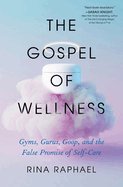
Boutique fitness studios, clean eating, meditation retreats: they all sound helpful at best, harmless at worst. But what about other offerings from the $4.4 trillion wellness economy, such as intuitive fasting, on-demand manifestation workshops and crystal-assisted exorcisms? Journalist Rina Raphael is skeptical: "Pseudoscience and quacks have always been a mainstay of American culture," she writes in her tour de force, The Gospel of Wellness: Gyms, Gurus, Goop, and the False Promise of Self-Care. "But we've entered a new era of uncritically accepting them and their charcoal-infused nonsense."
Why is this so? Raphael outlines the appeal of wellness to a population disillusioned with traditional medicine and conventional religion, and she spotlights the ways that the wellness industry takes advantage of women's unique vulnerabilities. Women are pressured to be the fairer (and buffer) sex, and they often work the fabled--and exhausting--second shift at home after a day at the office. "In a sick way," Raphael writes, "we're sedating women with consumerist self-care--or worse, silencing them instead of encouraging them to vocalize their grievances."
Although she doesn't give Gwyneth Paltrow of Goop a pass, Raphael admits that she comes to her first book as a consumer of wellness products. She also acknowledges that the industry has done some good by prompting people to consider their health as they shop. But Raphael's evenhandedness doesn't negate the overall radicalism of her thesis. The Gospel of Wellness is the exposé the First World didn't know it needed a lot more than it needs jade vaginal eggs. --Nell Beram, author and freelance writer

